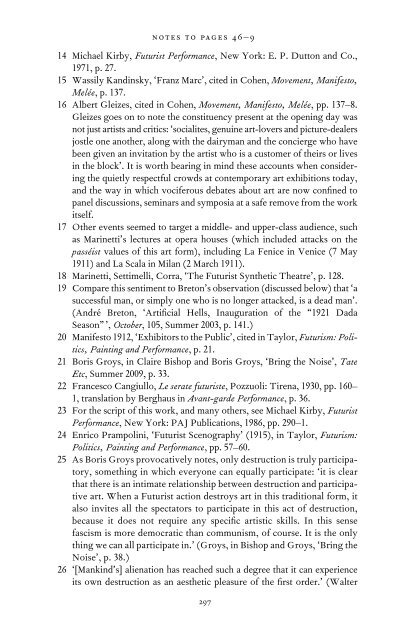Participatory Art and the Politics of Spectatorship - autonomous ...
Participatory Art and the Politics of Spectatorship - autonomous ...
Participatory Art and the Politics of Spectatorship - autonomous ...
Create successful ePaper yourself
Turn your PDF publications into a flip-book with our unique Google optimized e-Paper software.
notes to pages 46– 9<br />
14 Michael Kirby, Futurist Performance, New York: E. P. Dutton <strong>and</strong> Co.,<br />
1971, p. 27.<br />
15 Wassily K<strong>and</strong>insky, ‘Franz Marc’, cited in Cohen, Movement, Manifesto,<br />
Melée, p. 137.<br />
16 Albert Gleizes, cited in Cohen, Movement, Manifesto, Melée, pp. 137– 8.<br />
Gleizes goes on to note <strong>the</strong> constituency present at <strong>the</strong> opening day was<br />
not just artists <strong>and</strong> critics: ‘socialites, genuine art- lovers <strong>and</strong> picture- dealers<br />
jostle one ano<strong>the</strong>r, along with <strong>the</strong> dairyman <strong>and</strong> <strong>the</strong> concierge who have<br />
been given an invitation by <strong>the</strong> artist who is a customer <strong>of</strong> <strong>the</strong>irs or lives<br />
in <strong>the</strong> block’. It is worth bearing in mind <strong>the</strong>se accounts when considering<br />
<strong>the</strong> quietly respectful crowds at contemporary art exhibitions today,<br />
<strong>and</strong> <strong>the</strong> way in which vociferous debates about art are now confi ned to<br />
panel discussions, seminars <strong>and</strong> symposia at a safe remove from <strong>the</strong> work<br />
itself.<br />
17 O<strong>the</strong>r events seemed to target a middle- <strong>and</strong> upper- class audience, such<br />
as Marinetti’s lectures at opera houses (which included attacks on <strong>the</strong><br />
passéist values <strong>of</strong> this art form), including La Fenice in Venice (7 May<br />
1911) <strong>and</strong> La Scala in Milan (2 March 1911).<br />
18 Marinetti, Settimelli, Corra, ‘The Futurist Syn<strong>the</strong>tic Theatre’, p. 128.<br />
19 Compare this sentiment to Breton’s observation (discussed below) that ‘a<br />
successful man, or simply one who is no longer attacked, is a dead man’.<br />
(André Breton, ‘<strong>Art</strong>ifi cial Hells, Inauguration <strong>of</strong> <strong>the</strong> “1921 Dada<br />
Season” ’, October, 105, Summer 2003, p. 141.)<br />
20 Manifesto 1912, ‘Exhibitors to <strong>the</strong> Public’, cited in Taylor, Futurism: <strong>Politics</strong>,<br />
Painting <strong>and</strong> Performance, p. 21.<br />
21 Boris Groys, in Claire Bishop <strong>and</strong> Boris Groys, ‘Bring <strong>the</strong> Noise’, Tate<br />
Etc, Summer 2009, p. 33.<br />
22 Francesco Cangiullo, Le serate futuriste, Pozzuoli: Tirena, 1930, pp. 160–<br />
1, translation by Berghaus in Avant- garde Performance, p. 36.<br />
23 For <strong>the</strong> script <strong>of</strong> this work, <strong>and</strong> many o<strong>the</strong>rs, see Michael Kirby, Futurist<br />
Performance, New York: PAJ Publications, 1986, pp. 290– 1.<br />
24 Enrico Prampolini, ‘Futurist Scenography’ (1915), in Taylor, Futurism:<br />
<strong>Politics</strong>, Painting <strong>and</strong> Performance, pp. 57– 60.<br />
25 As Boris Groys provocatively notes, only destruction is truly participatory,<br />
something in which everyone can equally participate: ‘it is clear<br />
that <strong>the</strong>re is an intimate relationship between destruction <strong>and</strong> participative<br />
art. When a Futurist action destroys art in this traditional form, it<br />
also invites all <strong>the</strong> spectators to participate in this act <strong>of</strong> destruction,<br />
because it does not require any specifi c artistic skills. In this sense<br />
fascism is more democratic than communism, <strong>of</strong> course. It is <strong>the</strong> only<br />
thing we can all participate in.’ (Groys, in Bishop <strong>and</strong> Groys, ‘Bring <strong>the</strong><br />
Noise’, p. 38.)<br />
26 ‘[Mankind’s] alienation has reached such a degree that it can experience<br />
its own destruction as an aes<strong>the</strong>tic pleasure <strong>of</strong> <strong>the</strong> fi rst order.’ (Walter<br />
297
















